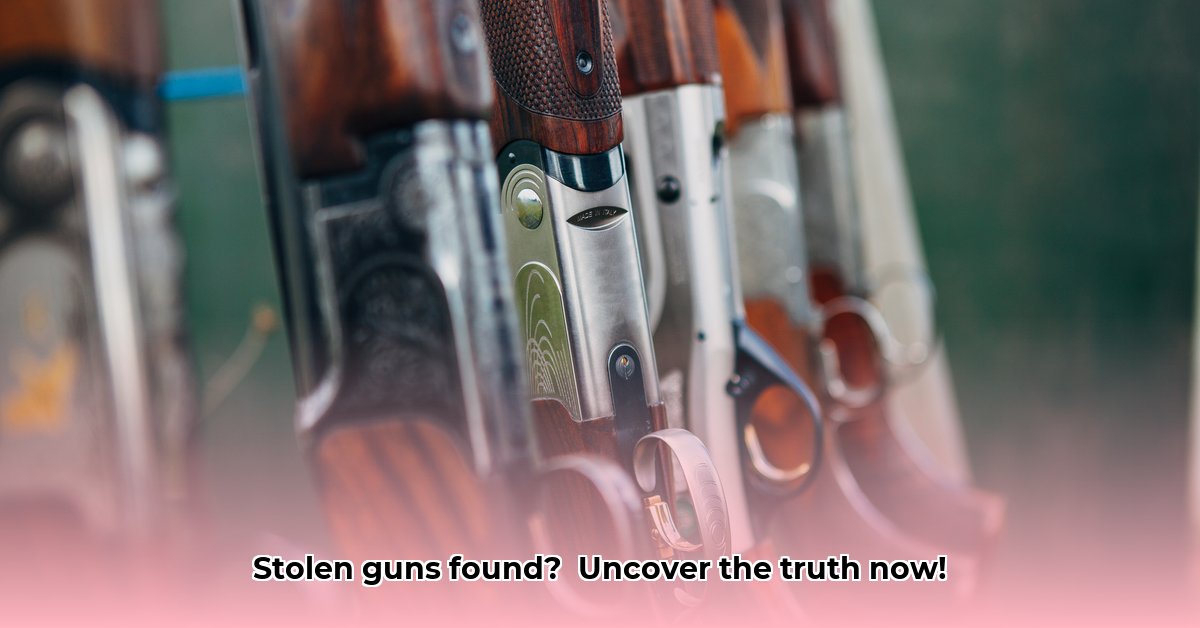
Hotgunz: A Citizen-Led Approach to Gun Tracing – An Analysis
HotGunz.com, a website offering a user-submitted database of stolen firearms, presents a compelling yet complex case study in citizen-led crime prevention. While its ambition to empower individuals in tracing stolen guns is laudable, a critical evaluation reveals significant limitations and potential risks. This analysis examines HotGunz's effectiveness, legal implications, and overall impact on crime prevention efforts.
The fundamental premise of HotGunz is straightforward: to aggregate information on stolen firearms from individual users and make this data publicly accessible. The sheer volume of potentially available data is significant, theoretically providing insights into gun theft trends and patterns. However, this approach suffers from a critical vulnerability: the unverified nature of the submitted information.
The absence of a robust verification process represents a major flaw. Anyone can submit details to HotGunz, making the accuracy of the database entirely dependent on the honesty and diligence of its contributors. While HotGunz acknowledges this limitation and advises users to independently verify information, this caveat raises serious questions about its practical utility. If every entry requires corroboration through official channels, the platform's time-saving benefits for law enforcement and community groups are drastically reduced; it might even add unnecessary workload.
This inherent lack of independent verification severely compromises the database's reliability. The risk of misinformation is substantial, akin to a game of telephone where each retelling distorts the original information, potentially leading to inaccurate or misleading results. This casts doubt on the database's true effectiveness, despite its purportedly large dataset.
Beyond accuracy concerns, significant legal and ethical questions arise. Data ownership, privacy rights, and the potential for misuse—including false accusations or wrongful arrests—are real possibilities demanding careful attention. The potential for malicious actors to exploit the platform by submitting false data to frame innocent individuals represents a significant threat, undermining the system's intended purpose and potentially causing irreparable harm.
Let's examine the impact on various stakeholders:
| Stakeholder | Potential Challenges | Potential Opportunities |
|---|---|---|
| Law Enforcement | Verifying data accuracy; integrating HotGunz data with existing systems; managing potential misinformation. | Access to potential leads; identification of gun theft patterns; potentially faster response times (if data is verified as accurate). |
| HotGunz.com | Maintaining data accuracy; addressing legal and ethical concerns; preventing data misuse; ensuring platform security. | Partnerships with law enforcement; development of improved data validation methods; creating a more secure and reliable platform. |
| Community Safety Groups | Assessing data reliability; combating misinformation; educating the community on the platform's limitations. | Increased community awareness; potential for proactive crime prevention strategies (with verified data). |
| Policy Makers | Navigating legal and ethical complexities; regulating citizen-generated data; promoting standardized national firearm tracing systems. | Investment in national firearm tracking systems; supporting community crime prevention programs; ensuring responsible data handling. |
Does Hotgunz truly enhance crime prevention, or does it introduce more problems than it solves? This rhetorical question highlights the central challenge of assessing the platform's overall impact. The answer depends heavily on addressing the core issues of data reliability, legal framework, and platform security.
HotGunz, despite its shortcomings, underscores the crucial need for improved national firearm tracking systems. The existing fragmented and inefficient system necessitates a comprehensive, nationally coordinated database that learns from both the successes and failures of citizen-led initiatives. The future viability of HotGunz and similar projects hinges on effective solutions to these challenges.
Verifying Firearm Data: A Multifaceted Approach
The process of verifying firearm data, especially from citizen-reported sources, is complex. While the National Crime Information Center (NCIC) database offers the most comprehensive source of information, its access is restricted to law enforcement. Publicly available resources, like HotGunz, rely on self-reported data, lacking the official verification needed to ensure accuracy and reliability.
Therefore, verifying the accuracy of citizen-reported data requires a critical and multi-layered approach:
Source Evaluation: Assess the credibility of the reporting source, considering motivations and potential biases. Unreliable data can lead to both false positives and missed opportunities.
Data Triangulation: Cross-reference information across multiple sources to corroborate details and create a more comprehensive picture. Relying on a single source is insufficient.
Bias Awareness: Recognize that citizen-reported data is inherently subjective and prone to biases, which can lead to inaccurate or incomplete reports.
Completeness Check: Ensure the reported information is complete, including serial numbers, markings, and detailed descriptions. Incomplete data significantly hampers verification efforts.
Data Age: Consider the timeliness of the information, as older data may be outdated and unreliable for current investigations.
The lack of a centralized, publicly accessible firearm database represents a critical systemic flaw. While existing databases like the NCIC and various state-level initiatives offer potential solutions, they are often inaccessible to the public and lack standardization.
Platforms like HotGunz attempt to bridge this information gap, but their inherent limitations must be understood. Users should exercise extreme caution, recognizing the platform's reliance on unverified data. They should treat the information as one piece of a much larger puzzle, not a definitive solution.
Effective firearm tracing requires a national strategy that includes:
- Improving public access to verified firearm information.
- Enhancing coordination among law enforcement agencies.
- Promoting responsible firearm ownership through education and improved verification methods.
A truly effective solution necessitates a balance between citizen involvement and robust data integrity, requiring significant improvements in data validation, legal frameworks, and platform security. Until these challenges are adequately addressed, the value of crowdsourced gun tracing databases like HotGunz will remain significantly limited.